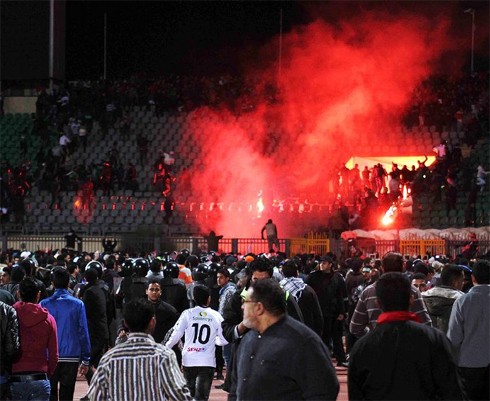(VOVworld) The world community is gravely concern about increasing violence in Egypt over the past few days. While ultimate responsibility for the violence is an open question, what is clear is that Egypt has been plunged into a bloody conflict, the public is losing trust in the government and further political and social upheaval is almost certain.
 |
Chaotic Port Said Stadium after a football match Photo: Internet
|
Since President Hosni Mubarak was overthrown a year ago, Egypt has seen almost daily demonstrations and violence whose climax came last Wednesday when nearly 80 people were killed and 1,000 were injured. During the next 4 consecutive days, people in Cairo and many other cities gathered in the streets to protest the new military government’s failure to control and bring peace to the country.
Many people are convinced that last Wednesday’s tragedy was planned. Hundreds of fans armed with knives or swords rushed onto the field after a football match despite the presence of a large number of security guards. The stadium’s doors were shut and the lights were off, generating suspicions that the violence was abetted by the army. A video recording made by eye witnesses show stadium police standing idly by during the violence. Some sources have reported that some 600 people who were hiding outside the Port Said stadium had received money to wreak havoc at the game. Another unusual thing has been reported - the police did not search fans entering the stadium.
During the demonstrations to overthrow President Mubarak last year, supporters of these two football teams were in the vanguard of the rebels. When the revolution took place, they set aside their differences to protest against Mubarak’s non-democratic regime, which they successfully overthrew last February. However, a delayed transfer of power away from the new provisional military government has made these supporters impatient and as a result, demonstrations and chaos have continued. Many suspect that the Egyptian Military council set up this bloody tragedy using a sports rivalry to divide and weaken the opposition. President Mohamed Hussein Tantawi of the Supreme Military Council has pledged to set up an investigation to find and punish those responsible and compensate the victims. He said this incident will not be allowed to ruin the political transfer.
Following the Port Said tragedy, many Egyptians have lost confidence in the army’s ability to control public security. People are marching in protest and clashing with the police turning Cairo into a battlefield in recent days. Demonstrators stone the police, who retaliate with tear gas. 9 more people have been killed and more than 2,000 others injured. The protesters are demanding that the military government conduct an early election and quickly transfer power to a civilian government. The political instability in Egypt has let to increasing crime. In Al Arich in the northern Sinai, an explosion struck a gas pipeline running from Egypt to Israel, the latest in a series of attacks in the increasingly volatile Sinai region. The pipeline, which also supplies gas to Jordan, has come under attack at least 12 times since Mubarak was toppled in February 2011.
In face of increasing demonstrations, the army set up a military council which will nominate candidates for the Presidential election by February 23, 2 months earlier than the schedule of April 15th. As a result, the presidential election will be held in April or May, earlier than the previous schedule of July. Analysts warned of a new crisis in Egypt if the provisional military government delays the transfer of power.
Anh Huyen